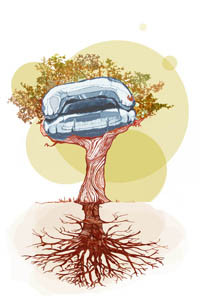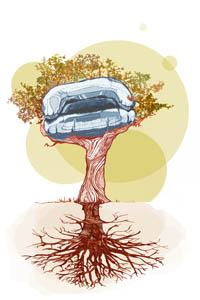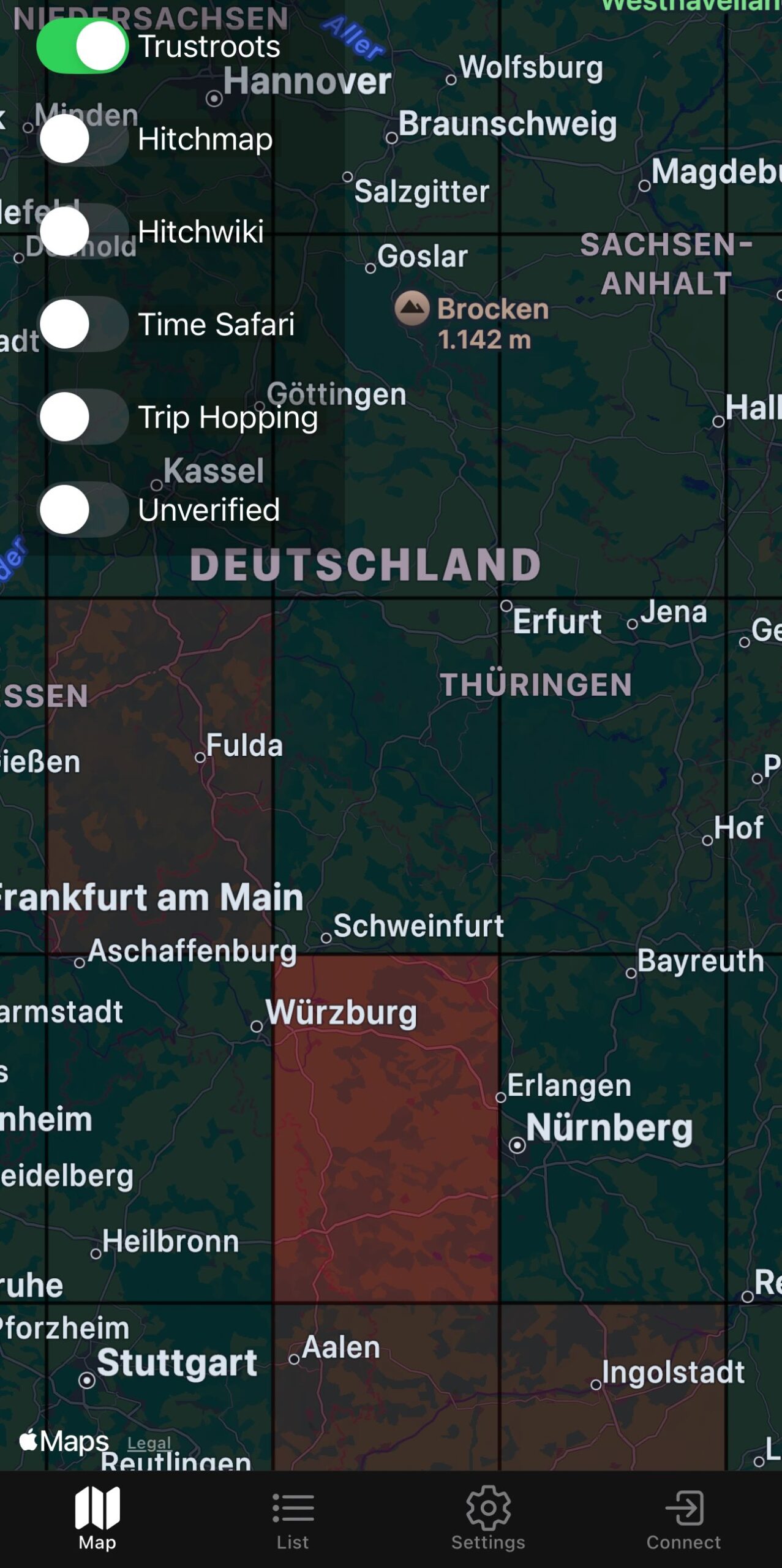
I’m writing down my own opinions, ideas and experiences, these are not necessarily shared by other team members.
The roots of this website have been growing for a long time. Back in 2005 I wrote an article about how hospitality exchange websites should be based on free software and free from censorship. In August 2006 I joined the Couchsurfing Collective in Montreal. For a couple of months I traveled to amazing places with fun people while feeling the excitement of potentially changing the world in a big time, reaching a 100.000 people ready to share their homes to strangers, while working with some amazingly smart people.
More than hospitality
Of course I didn’t have the illusion that merely surfing couches would suffice to create peace on earth, but I saw couchsurfing as a way to get to something bigger. Do more than just hospitality. But for that to happen it was important to grow it into an organization ran by volunteers working in a way similar to open source projects. With code under a free license. During the discussions about Couchsurfing’s outrageous non-disclosure agreement early 2007 it became clear to me that that wasn’t going to happen. (And meanwhile BeWelcome was launched in January 2007.)
The roots of Hitchwiki

Hitchwiki didn’t start of as “Hitchwiki”. When I started hitchhiking there was no good source with hitching info. I came across a hitchhiking wiki, started editing there for a while. But it was quickly overrun by spam. No admin in sight. So I moved it to Wikia, with ads and not much room for customization. In November 2006, while at the Couchsurfing Collective in New Zealand MrTweek and I moved it to Hitchwiki.org – after I refused an offer to put it up at hitchhiking.couchsurfing.org and host it on couchsurfing servers – we can all be very happy for that.
In the past 8 years Hitchwiki has grown into the ultimate resource for hitchhikers. In 2008 or so Mikael appeared and offered to add a mapping application to Hitchwiki. “Do it!” That’s how things grow. We also launched some other projects, some relatively successful (like Trashwiki), some abandoned to some degree and others hopeful and in need of some growth (Nomadwiki, Veganwiki). I’ve also joined and hosted a couple of hackathons to work on these projects and also on BeWelcome.
Democratic open source projects
BeWelcome is a great project and I’m still very much supportive of the concept of democratic open source hospitality exchange. Unfortunately I don’t feel the time I spent on improving BW has been very effective. It’s hard to create software by committee. There has definitely been progress but I think the whatever happens at the start of a project can largely determine its future and with BW the code base that was used as a start was far from ideal. Another issue is the fear of power concentration. BW was started by people who had been dealing with a dictator- management style for years within Hospitality Club. I tried to move a bit more towards a do-ocratic way of working, but this didn’t really work out so well either.
All in all I’m happy for trying but it’s clear to me that my time and energy are better spent elsewhere. I didn’t come to this conclusion on my own and thus it was finally time to pick up some pieces and ideas.
Taking (trust)root
Trustroots was released 4 days ago. Almost all of this was the work of Mikael. Callum and I first wanted to build it in Meteor, a very nice real-time JavaScript framework but we kind of stalled with that. Mikael simply went ahead and did it with Mongo, Express, Angular and Node (MEAN). Do-ocracy at work. Now there’s a working proof of concept.
In a very short time hundreds of people have joined and this is with the most MVPish thing we could imagine. And whenever I check the numbers these days I see more and more people. Of course this growth can flatten very soon if we would stop here.
Next steps
1. beyond hitchhikers
Hitchwiki will be a great place to really get Trustroots growing. We have many visitors on there and if we properly integrate the two projects we’ll see a nice boost.
Another fairly obvious step is to look behind hitchhiking. Warm Showers is a great website for traveling bicyclists. It’s fairly good at what it’s doing, so we won’t do the same thing for bicyclists, but we will do it for dumpster divers and for traveling veg(etari)ans it can be very nice to stay with (and host) like-minded people – plus this will be a nice way to grow the related wikis.
I see this happening as follows: people can sign up to be part of specific groups (e.g. only veg) and we’ll only do this for a limited number of groups so we can quickly get enough critical mass among a specific niche group. Using the spread and growth of hitchhikers (who are constantly meeting people) we can extend into other fields.
2. API and mobile
Most important for mobile is that the web app Trustroots works well on all mobile browsers.
An Android app would be an excellent addition and I expect someone (contact us) will come up and offer building one very soon. This requires a solid API though and I’m not yet sure how this works out with the mean stack we’re using.
3. trust beyond hospitality exchange
Since 2007 sharing has become big business. Uber and Airbnb have 9 figure valuations. This wasn’t exactly what I had in mind when I was dreaming of a better world in 2006 but it’s exciting to see that there’s a lot more potential for new things now. We should go and build a ride share application that works for hitchhikers – and that works within cities.
We also want to share resources and connect people beyond couches and transport: adventure! I’m thinking along the lines of the Decentralized Dance Party and real life gaming. Once we have gathered enough trust in a city (Berlin will probably be the first) it will be possible to organize ad-hoc pot lucks and share resources among people in a much wider scale.
As for trust itself, I’m about to restore a project I worked on before. In 2007 I spent some time in Italy doing research and writing code related to trust metrics. I’ll write another blog post about these things soon.
4. A Trustroots collective
We’ll organize a Trustroots collective some time in Spring, somewhere in Europe, most likely in Berlin. We want to keep it focused, open and clear.
Legal and financial
We want to focus on growing this thing and adding new cool features. We promise to set up some kind of European non profit organisation and we need your help with that. Ideally we want to be able to handle most of this online and in English.
Financial resources would be nice to allow us (which can include you) to spend more time on this project, in the form of paying for rent and other expenses. If this can be done through donations, great. Another possibility is looking for grants (but that’s probably a full time occupation on itself, wanna help?). I definitely want to exclude advertising: no ads on trustroots.org.
Other spin-off projects
In the long run however I think the code (and the team of people we’re building) can have a lot of potential and I’m personally not excluding the possibility to use the same code base to build a project that is for profit. As for how to set up such a thing, I like Mozilla’s example, which is a company owned by a non profit.
Just to be clear I promise that the core hitchhiking Trustroots project remains non profit and faithful to basic principles, just like Hitchwiki.
Wanna help?
Further reading





Responses
Great read! I have a good feeling about this. If the server capacity can keep up with the programmer’s amazing progress..
I’m sharing this in my circles.
So you know amyl.in? It’s a small world indeed..
Perhaps we could organize virtual side events of the TrustRoots Summit, in different cities and communities in Europe (especially rural communities would make a great addition, picture someone between turnips and chickens with a laptop and an excentric guest)
TFS – well put! I hope TR doesn’t somehow limit itself from being used effectively, or from being popular, purely for HospEx. Though the “Groups” idea should allow natural and enthusiastic growth in any/every category of interest, whether Vegans, Anarchists, Musicians, or PureHospEx (regardless of your method of travel – on foot, by bicycle, flying, etc.) It still sounds like a “universal” trust/connection/directory tool, which is wonderful!
Also like Kamiel’s suggestion for virtual/online side-meetings, during the anticipated Spring’15 TR Collective (although I am now checking ticket prices to Berlin…)
Current coding activity appears to be furious, and the particular team assembled, can only bring excellence!
Glad to see your long-held vision becoming a reality, Kasper.
However, don’t you think it’s time for a decentralized solution? That was supposed to be what Couchsurfing 2.0 was about, but it was co-opted by a predator. That’s the problem with any concentration of power or authority; all such structures/organizations attract predators and parasites (or psychopaths and sociopaths, if you prefer) eventually, even when they are founded with good intentions and are vigilant.
We have the technology now for a decentralized trust network (the blockchain technology). You mentioned cryptocurrencies. I recommend Nxt over the others. It is just coming out with a monetary system that allows you to create coins or tokens (that could be used for hospitality exchange), secured by the underlying decentralized network. It’s never been easier. But the concept could also be extended to a decentralized trust network.
Hi John, decentralization would be very nice. But buying and selling cryptocurrencies goes against the basic idea of free hospitality among hitchhikers (our main first focus). And if we would give away the crypto for free it would attract a lot of people we don’t want to attract.
That said, it would still be very interesting to create a system that works in slightly different ways, possibly through crypto. Check also the geeky stuff section at https://www.trustroots.org/#!/about
I’m not talking about monetizing hospitality, which is virtually an oxymoron. I only mentioned crypto-currencies because you did, and I thought you might see the potential for decentralized trust networks based on the blockchain technology.
Although the abuses that money typically enable have no place in hospitality, local or specialized currencies can be used in a positive way to facilitate fair exchange, and even lead to a more caring society.
Local Currencies Foster a More Caring Society
I also like decentralised internet, but creating something like that from the very beginning creates too much technical weight for a project that’s supposed to take lift without too much coding.
There are plenty of examples like this out there: geeks coding all day long and having brilliant technical solution — but no users.
Later, when we have more time and users, decentralisation is of course possible.
“…I think the whatever happens at the start of a project can largely determine its future…” — Kasper
It seems that the tone has already been set: no real innovation; essentially couchsurfing lite, but with new overlords. Been there, done that, moving on.
You’re making strong statements here, only 8 days after the launch of an MVP. Anyway, that’s fine with me, I’ll propose you move on and take another look in a year from now.
John, well, I thought we’re having an discussion here. You gave your view, we ours; it’s simply not what I’d like to spend my coding days on right now, but I’m open for it. I think it’s a bit unfair you’re leaving the discussion simply by stating we’re overlords of some sort or that there isn’t innovation. Pity if you see it that way! For instance we’re right now trying to figure out how to make references system in a new way and we’re being very open for discussion and for new team members.
Kasper, Trustroots has probably already moved beyond hitchhikers: it’s just my impression, but so many of the recent signups show no sign of being interested in hitchhiking (or at least willing to host hitchhikers with their special needs), freeganism, or other topics dear to your heart. Instead, we are seeing a lot of “Couchsurfing refugees”, people with more mainstream interests who simply want a more functional site than CS. That’s a real shame, and my enthusiasm for this project has quickly waned.
Sharing is nice, but few people want to share with everyone else in the world; rather, a lot of hitchhikers would have appreciated a more exclusive community where they can be sure that all members hold a value like hitchhiking in common. While you might create a groups system on TR where hitchhikers can find each other, that would still make hitchhikers a minority among a much more general membership. Why should hitchhikers then support a network where most people don’t understand their lifestyle, or even actively oppose it?
TR could have been for hitchhikers what WS is for touring cyclists, filling an important niche. Unfortunately, your grand aspirations about trying to make the world a better place and be all things to all people, will sharply limit the site’s utility and appeal for such travelers.
Christopher:
Do you make use of any other similar site, like BW, which _isn’t_ focused on hitchhikers? I’ve seen lots of activity in hitchhiking on a site like BW, for instance. Haven’t once noticed any complaint. Have seen similar activity on CS, again with no noticeable complaints from “non-hitchhikers.”
I have hitchhiked only a little, years ago. Regardless, I certainly “understand the lifestyle,” and certainly don’t “actively oppose it.” To the contrary! Similarly with regard to veganism, freeganism, dumpster-diving, camping or sleeping rough, “anarchy,” etc.
I may be much more stationary nowadays than someone who’s still frequently traveling on foot and by found-rides. Regardless, you’re welcome to stay with me, just drop me a line! If you’re going to show up late or are on a very strict/minimal budget, that’s perfectly OK too.
It’s a small world, and life is short. Here’s to travel, meeting new people, and building friendship, by whatever method!
Also, this seems to be the downside of a “do-ocracy” where the only doing is writing code. A community needs more than code, it needs to debate and decide very early on the target demographic, general rules, and other administrative issues. I don’t see that happening here. There’s not even an open discussion forum (only the Freenode channels, which few know about, and Github issues, which aren’t ideal for this sort of thing). By having a small group of people write code without the ability to discuss and debate its utility, makes TR as closed and clique-based as Casey-era Couchsurfing or what BW is sometimes accused of. You might create a non-profit structure next year, but that will come only after a small handful of code-committing people have already unilaterally set a direction for the site.
As soon as I see open discussions about TR are productive and/or motivating I’m very happy to spend more time on this (both discussing and tech ways to get this going).
Unfortunately this thread and threads on BW and CS forums about TR are not very promising. Seems better for the project to focus on getting stuff done, and that part is working out fairly ok and discussions on GitHub look quite directed, productive and motivating to me.
This is what I feel personally, but I think it’s similar for Mikael and others.
“As soon as I see open discussions about TR are productive and/or motivating I’m very happy to spend more time on this”
By refusing to provide an open place for discussions and take views from the membership into account, any talk of openness and volunteer-based development is very disingenous. You are seriously dismissing calls for clarity by claiming unilaterally that they are “unproductive”? John’s right that this looks to be CS 2.0, except instead of Casey and his friends, we get Kasper/Mikael/Callum. You want to “get stuff done”, but the only people who decide what gets done is you yourselves.
Again, by the time you create any formal volunteer structure, you will have already decided the course of the project. Furthermore, there will probably be some suspicion that you will game the creation of a formal structure in a way that ensures you can keep all control for yourself and your friends in perpetuity. (Also, the use of a term like MVP in the context of a project that promises not to turn into a business is foreboding.)
Man, are you sure you mean that? :-) We’ve got dozen ways to contact us both publicly and privately and we’re having big part of our discussions and plans publicly out there. We also spent massive part of our time discussing with people (just like right now) and there are people who’ve come and taken part in programming and discussions about technical issues. I’m looking forward to see this happening also with non-technical matters.
I’m really sorry we can’t get everything done for everyone in one week (setting up forums, this and that feature, etc), be sensible and try to bear with us! Patience, positive attitude & vegan pancakes. :-)
“Man, are you sure you mean that? :-) We’ve got dozen ways to contact us both publicly and privately and we’re having big part of our discussions and plans publicly out there”
So far I see blog posts with comments section, a Github repository that isn’t ideal for administrative discussions, and two Freenode channels that hardly anyone knows about. These may serve for me to address you, but they are not places where the membership in general can come together and work out the direction of the site. You, and you alone, are deciding that, and my request that this be immediately opened up to the community is dismissed by Kasper as “unproductive”.
I realize that, as Kasper writes, it’s hard to write code by committee, and the writing of code should be left to those with novel ideas for the UI and such. However, something as basic as the very purpose of the site should have been clarified early on, don’t you think? Originally Trustroots was pitched as an extension of Hitchwiki, then Kasper blogs here saying he wants it to be for everyone, and now within only a week we see that hitchhiking has been left behind (judging from the bulk of profiles). This is becoming nothing more than a massive vanity project for the three of you.
You would have better served the hitchhiking community by involving at least some of the Hitchwiki community in discussions, and ideally before launch. If you don’t want to focus on hitchhikers, at least drop the pretence that you are doing this for a community of users. You apparently cannot even define what kind of community you want to create!
I also think the lack of a chat forum here presently, might be a good thing. And even without that, I’m _already_ expecting a guest in a week or two! TR obviously “works” well enough for the people happy to make use of it, especially those who aren’t worried if it’s meant primarily for hitchhikers or “non-hitchhikers.” If facilitating real-life connections between people is the goal, TR is already succeeding in that mission. And just out of the gate, with a minimum of features! Impressive.